This edition published in 2016
First published in 2013
Copyright Ian Birt 2013
All rights reserved. No part of this book may be reproduced or transmitted in any form or by any means, electronic or mechanical, including photocopying, recording or by any information storage and retrieval system, without prior permission in writing from the publisher. The Australian Copyright Act 1968 (the Act) allows a maximum of one chapter or 10 per cent of this book, whichever is the greater, to be photocopied by any educational institution for its educational purposes provided that the educational institution (or body that administers it) has given a remuneration notice to the Copyright Agency (Australia) under the Act.
Allen & Unwin
83 Alexander Street
Crows Nest NSW 2065
Australia
Phone: (61 2) 8425 0100
Email:
Web: www.allenandunwin.com
Cataloguing-in-Publication details are available
from the National Library of Australia
www.trove.nla.gov.au
ISBN 9781760293321
eISBN 9781952534171
Disclaimer
The author and all other persons involved in the publication of this book expressly disclaim absolutely all and any liability and responsibility whatsoever to any person for any claim made based on the contents of this book, or for any consequences arising from the use of this book. This disclaimer includes exclusion from liability or responsibility for any errors or omissions. This publication is a general guide and not intended as a substitute for expert advice. No person should rely on the contents of this publication without obtaining advice from an appropriate professional person. If professional advice is required, the services of a competent and qualified person should always be sought.
Set by Midland Typesetters, Australia
Cover design: Sarah Anderson / Julia Eim
Contents
This book shows you how to prepare and use a business plan for your own small operation. The book is a practical guide for anyone wanting to start or who is already in a small business. The book is also intended as an essential educational text for people studying small business management.
Research consistently indicates businesses that use formal planning outperform those that do not. Not only will you increase your business performance by planning, you will also improve your survival chances in the small business arena.
There are three good reasons to prepare a business plan for your small business:
1. A business plan enables you to set a growth direction for your business to follow and provides you with a comprehensive set of standards against which business performance can be measured.
2. Preparing and working through a business plan enables you to understand your business, as well as to determine the viability of any proposed small business.
3. The business proposal detailed in your plan is a vital selling tool to influence a lender to advance funds.
It is important to realise that you have to prepare your business plan personally to get the real benefits. The plan must reflect your own intentions for the development of your business, not those of someone else.
The book is divided into two parts, with two appendixes:
.
shows three sample plans for different kinds of small business situation. The introduction to this part will help you select an appropriate plan for your particular business circumstances. Note that these sample plans are intended for illustrative purposes only, not to copy.
There are two Appendixes. suggests various ways in which a small business can become more environmentally friendly.
There are also answers to the quick quizzes plus a glossary of business planning terms at the back of the book.
By following the guidelines provided in this book, you should be able to prepare and use a sound business plan for your own small enterprise.
Ian Birt
Objectives
After studying this chapter, you should be able to:
define a business plan
recognise the significance of business planning for business success
set a business goal
explain the functions found in any business operation.
Every business operation should have a business plan to which it can work. Any business operation has the following characteristics:
systematic organisation of resources (inputs)
repetitive selling of goods or services
predominant profit-making purposes.
So, what is a business plan? A business plan is simply a formal written blueprint for an operation in the period ahead. It provides a roadmap for where the business is going. The plan contents are arranged in a structured format and logical sequence to cover all aspects of the operation. Each section of the plan is coordinated and consistent with other sections.
A business plan should anticipate growth and development of the business operation. In a small business, a business plan is a written expression of the owners intentions for the development of the business in the medium to long term. It begins with an analysis of the existing situation so that realistic growth can be planned for in the future. The plan should ideally be for three years but should extend no longer than five years, because it is difficult to plan with any real certainty beyond this time. A business plan explains how to reach your business goals. The plan will set a direction for your business to follow by defining business objectives and outlining the methods (strategies) to achieve them. In other words, a business plan describes a course of action to follow in order to achieve specified objectives.
A completed business plan will enable you to determine:
what to do
why it is being done
how to do it
when to do it
who will do it
what resources are required
where you will be.
EXERCISE 
1.1 Define a business plan in one sentence.
Every small business should have a formal operational plan, although in reality most do not. Studies consistently indicate businesses that work to a prepared business plan for the entire operation significantly improve their survival ability, and thereby their chances of future business success.
Businesses that use formal planning have a head start and a good chance of outperforming businesses that use informal planning or no planning at all. However, business planning is only beneficial if it is done properly.
Apart from the incentive of improved business performance and survival chances, there are three good reasons for preparing a formal business plan in a small business:
1. A business plan enables you to set a growth direction for your business and provides you with a comprehensive set of standards against which to measure business performance.
2. Preparing and working through a business plan is an effective way of determining the viability of any proposed small business.
3. The business plan is an essential selling tool to influence lenders (or prospective partners) to advance funds.
 EXERCISE
EXERCISE
1.2 Give three reasons why a business plan should be prepared.
One of the real benefits of putting together a business plan can be found in the process itself. It will force you to examine all aspects of your operation, and to think carefully about how each will be developed in the future. Whether the business is an existing or a proposed one, you will understand your operation better after you have completed a business plan.

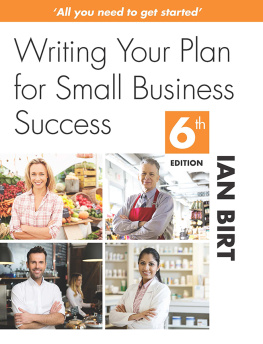
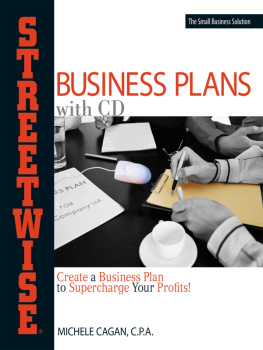

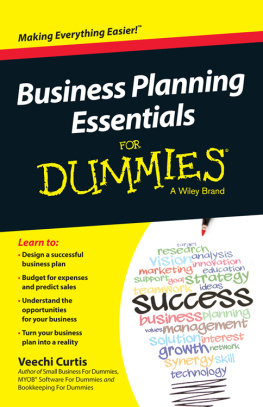


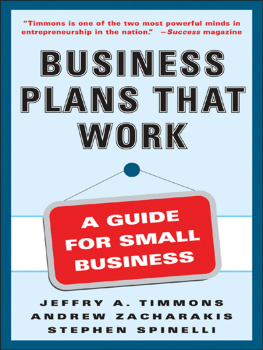
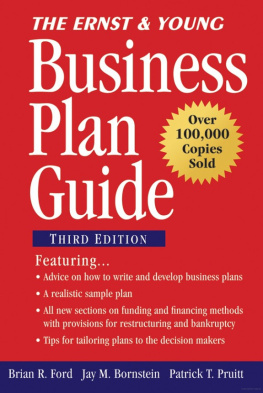




 EXERCISE
EXERCISE